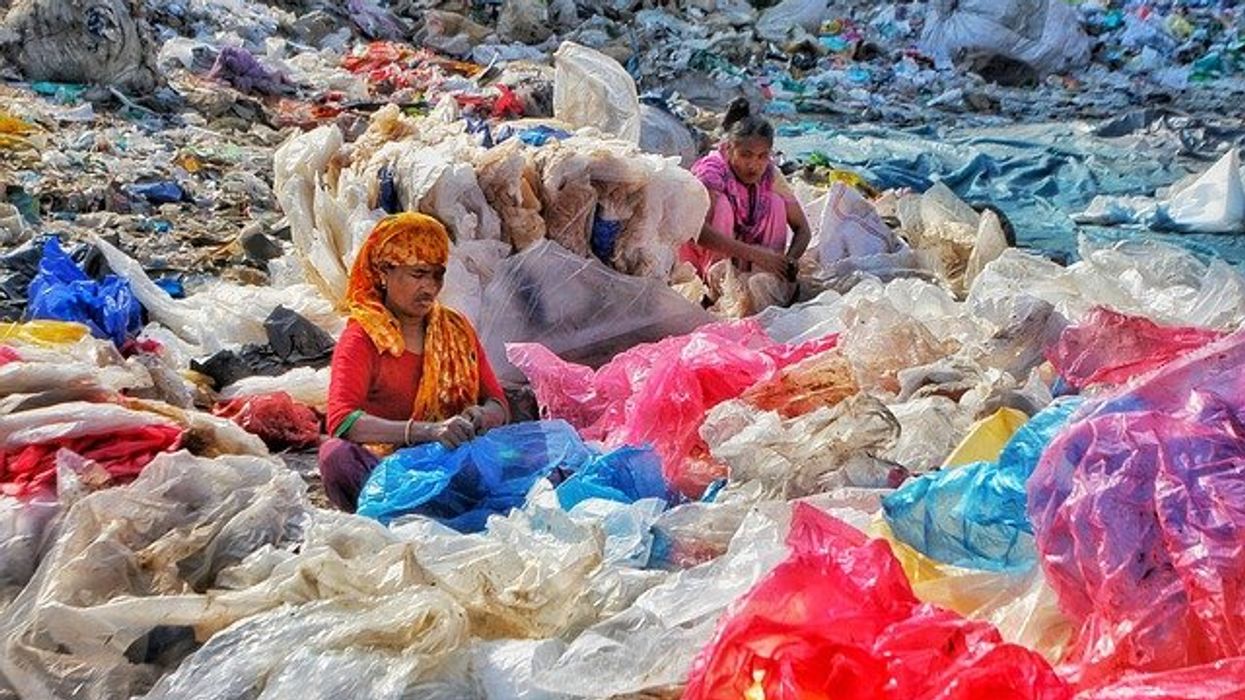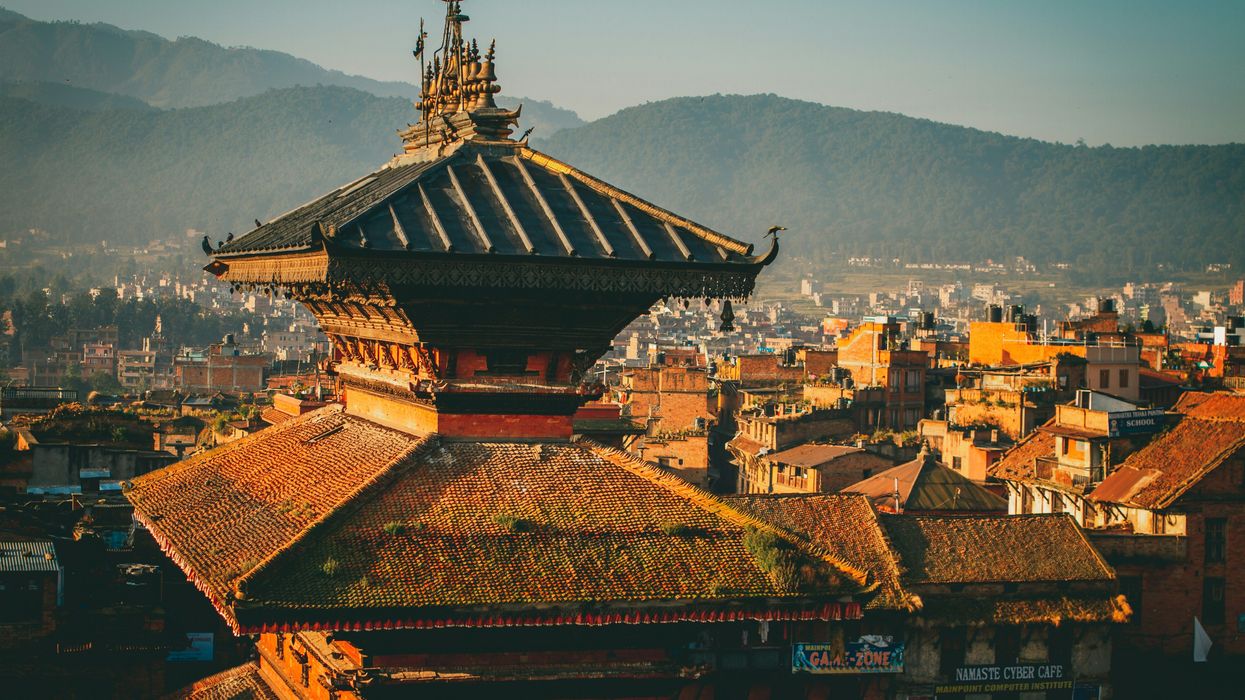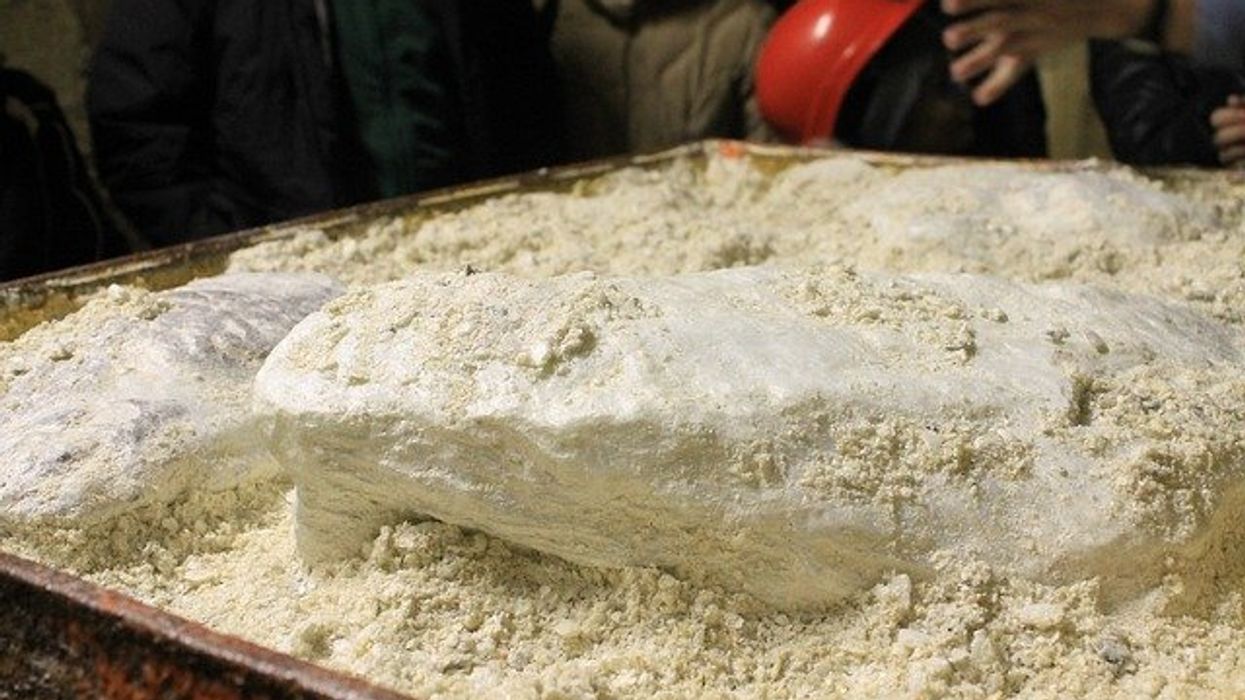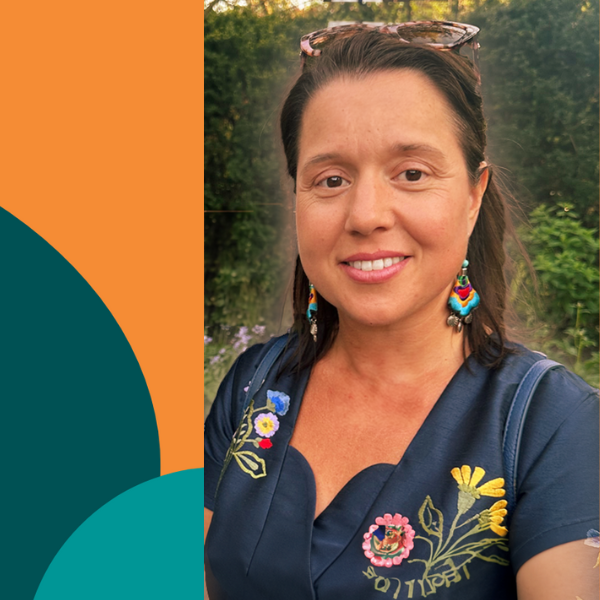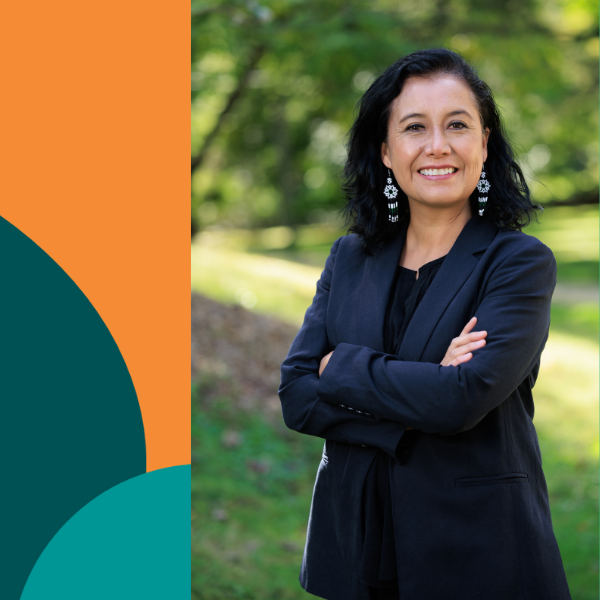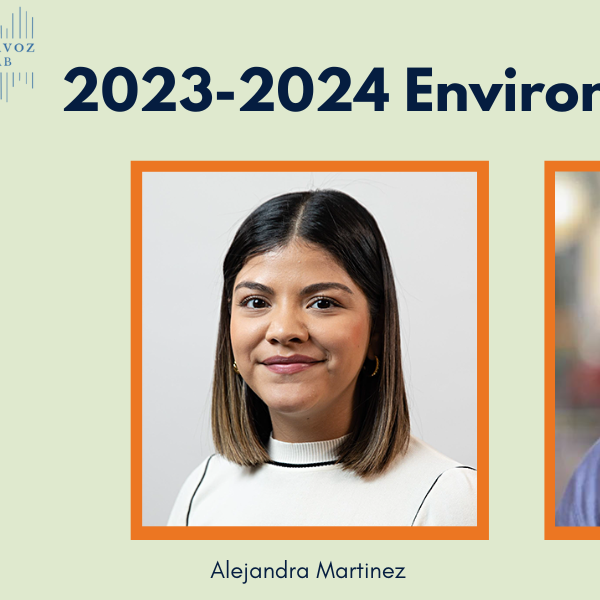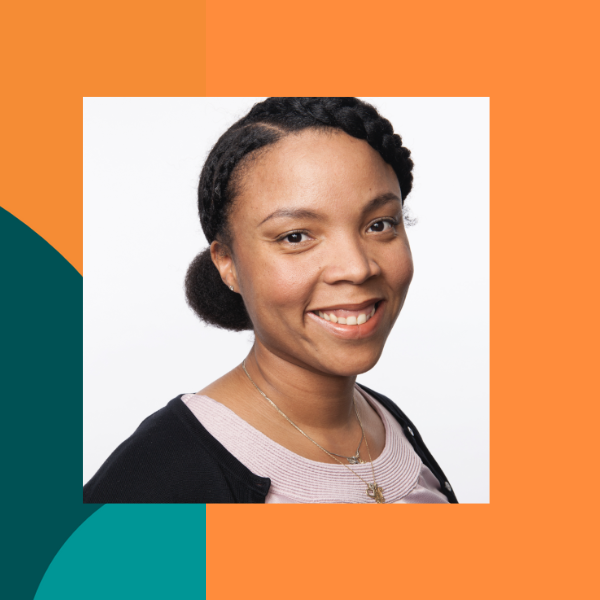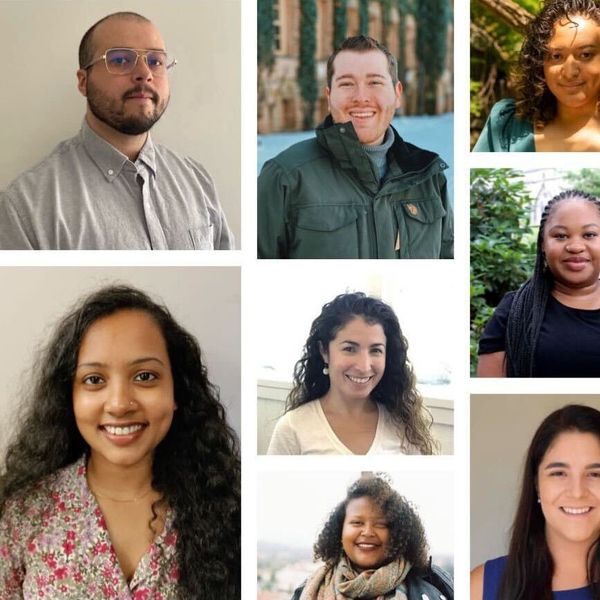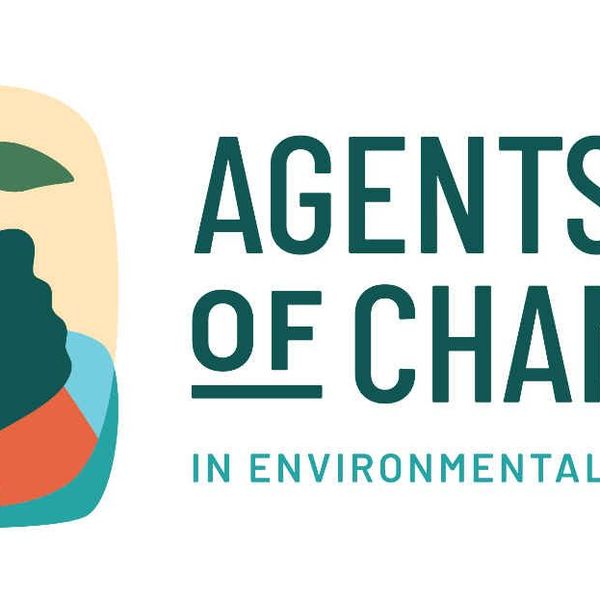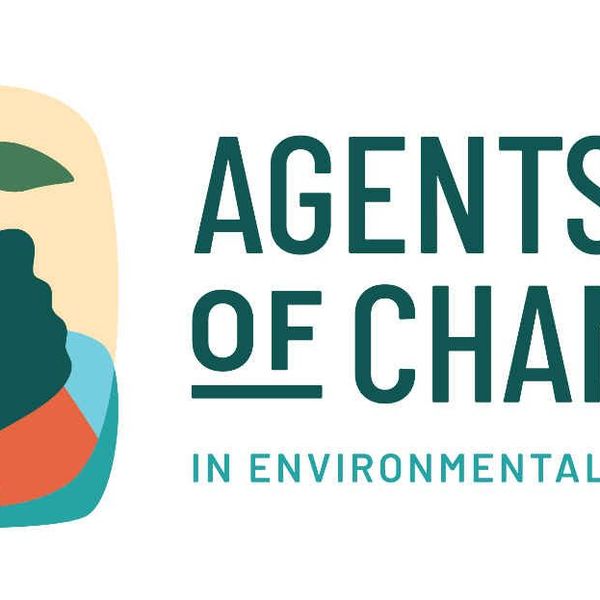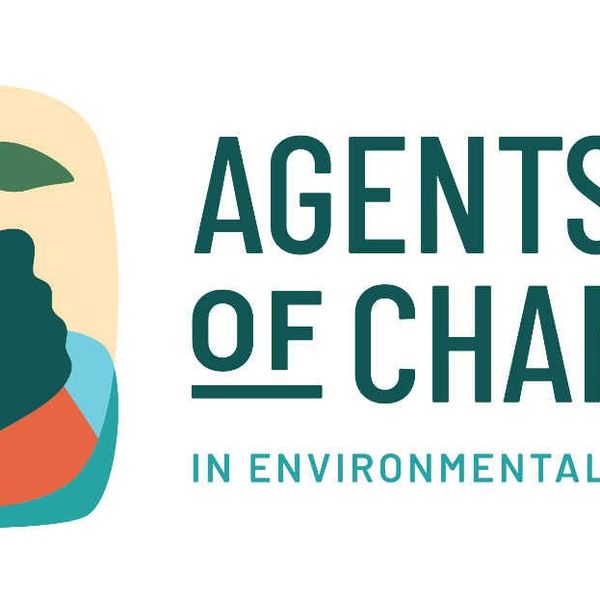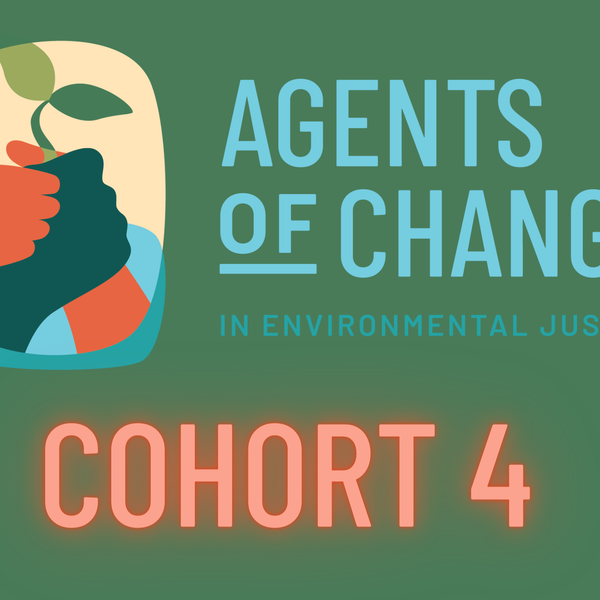Senior Agents of Change fellows Enjoli Hall and Dr. Tatiana "Tots" Height discuss what drew them to urban planning and how they envision the field could better center the histories and lived experiences of Black communities.
Hall is a Ph.D. student and Ford Predoctoral Fellow in the Department of Urban Studies and Planning at the Massachusetts Institute of Technology, and Height recently defended her doctorate in the Agricultural and Extension Education from NC State University.
The Agents of Change in Environmental Justice podcast is a biweekly podcast featuring the stories and big ideas from past and present fellows, as well as others in the field. You can see all of the past episodes here.
Listen below to their discussion, and subscribe to the podcast at iTunes, Spotify, or Stitcher.
Transcript
Tatiana Height
Hi everyone, my name is Tatiana Heights, but I go by “Tots” for short. And I am a doctoral candidate in agriculture and extension education at North Carolina State University, where I also teach environmental ethics in the Interdisciplinary Studies Department.
Enjoli Hall
Hey, everyone, I'm Enjoli. I'm an urban planner from Buffalo, New York and I'm currently a PhD student at MIT in the Department of Urban Studies and Planning. And we are both part of the third cohort of fellows in the Agents of Change in Environmental Justice program. We are the only urban planners in our cohort of fellows, so we decided to sit down and talk about how we came to the field. And in particular, we wanted to think about histories of planning and what histories are amplified and obscured in planning, and to also share our visions for the future of the field and what it could look like in particular to center the histories, lived experiences, ideas and aspirations of Black communities in planning.
Tatiana Height
Alright, so today we're doing a podcast, we're calling it exploring migration, Black geographies, and environmental justice. Both of us are Agents of Change fellows. And I think we got partnered together because we both, I mean, everybody has interested in environmental justice. Obviously, it's part of the fellowship, but we both happen to be urban planners, I think we're the only two urban planners in the group. So at least for this cohort, so given that being the case, I think, sort of naturally came that what it seemed like our overlapping interests were, were around were around Black geographies and environmental justice, and what does that mean, for our people? So to start out, we want to just talk about, you know, how do we, what is urban planning? How do we come to urban planning, before we get started getting some more of the meat just so that we can sort of set the stage for you all. So what do you want to, do you want to describe urban planning? Do you want me to give my take and you give yours, what you want to do?
Enjoli Hall
Yeah, I'm happy to give what I think is like maybe the textbook definition. And I think we can elaborate on that. I think generally people think of urban planning and as sort of like, mundane details of zoning and development control and land use regulation. I think more generally, urban planning could be understood as sort of the preparation of plans and policies and programs to sort of guide the development and regulation and management of, of neighborhoods, cities, towns, regions, in an attempt to sort of guide how, how resources are distributed and planned out, such as housing, green space, roads. But what's your take? How do you understand urban planning?
Tatiana Height
Yeah, I do like to describe it to people as just the, the folks who plan out what communities looks like. And that can be either on a neighborhood level, that could be on a city level, it could be counties, it could be regional, it could be national. And there's just so many different things that you can do with it. There's so many different emphasis areas, you have people who focus on historic preservation, people who focus on water, people who focus on parks, and only do that. Or people who you, yes, only do zoning, and that's like the most boring. Important, but it's like the most boring part that you can do. But yeah, I think most people haven't even heard of it. And a lot of times I say, you know, I'm a planner, people will think that I'm planning events. And I'm like, no planning space, planning where people live to make sure that it's healthy and safe.
Enjoli Hall
Yeah I agree that when I tell most people that I'm a planner, they're like, they don't know what that is. But when I explained it to them, they're like, oh, obviously, that's, that's really important. Like, and that's for me, how I sort of came to planning is, I didn't have a name for it. But I think growing, I grew up in Buffalo, New York, one of the most racially segregated cities in the United States. And I grew up in a multiracial household. And so I had, my father's Black, my mother's white, they both were born and raised in Buffalo, but in very different neighborhoods. And so growing up and sort of traveling to visit my family, on both sides, I observed very clearly differences in sort of built environment and what was available in different neighborhoods across the city, and that it was very racially segregated. And I was just curious as to why is this the case. And it wasn't until I got to college where I started to take a couple of classes in urban studies or on, sort of the history of, of the US on with a focus on race, that I came to start to understand that, like, the conditions in our neighborhoods and cities were like, didn't just happen by chance. They were often the result of policy, often with the intention to discriminate particularly against Black communities and deprived communities of the resources they need to, to thrive. And so I was like, well, okay, what do you do about this? And when I understood that there was this field that's focused on trying to intentionally plan communities, I was like, oh, this is, this is great, because we're talking about the material conditions of people's everyday lives. And we're talking about the, the places where we live and work and interact with on a daily basis. So this is something that's just really grounded in just everyday life. And that was really appealing to me. But what about you, sort of, how did you come to planning and environmental justice?
Tatiana Height
Well, I know, the audience can't see me, but I'm just like nodding when you're talking. Because that was, that was super interesting. Not exactly what happened, in my case, but still very, very interesting. For me, I had a very zigzaggy path to get there. I, you know, I was studying natural resources in undergrad, and then, you know, I was trying to figure out what I could do with that. I was interested in doing something environmentally speaking. I had had a trip down to New Orleans, but I was thinking back on some sustainable redevelopment that they were doing post-Katrina, and these, you know, environmentally friendly buildings, you know, LEED certified, and all of this stuff and, and flood-proof buildings that they were doing down there. And I was like, hmmm, you know, this seems like something they're doing to better the community, it's environmental, how can I get into this? And I thought architecture. And I had spoken to someone about architecture, and then you know, she was like, you know, this, you're, you're, you're coming at it the wrong way. It sounds like what you want to do is more, you know, community impact and that kind of thing. And so she introduced me to the, she was the dean of the College of Architecture, introduced me to the concept of urban planning. And so I declared a minor in it, thought it was really interesting, was studying stuff around homelessness, and all sorts of community issues. And then, you know, later when I was figuring out what I wanted to do a master's and I was like, you know, this is really the only thing that that I think is interesting, right, for me right now is, is around is this urban planning and studying more of that. And I was really wanting to study not only environmental justice, but also you know, meeting facilitation, how do you do collective processes and coming to consensus around what you want to your communities and that kind of thing. And so that's what I did. But I do think it's important to say to just with this whole urban planning thing is that, because I know you mentioned, you know, these things didn't just happen by chance. And that's sort of why the field came to be is because things were sort of happening. There was no intentionality around, you know, where things were, and it was causing issues for people in their health. And so, you know, planning comes out of things like architecture, public health, and then social work. And so even us within this space of the Agents of Change, and so many people who are interested in that public health piece, planning as a part of that too, because we had these issues where you had stuff like a factory near somebody's house, and what is it doing for their health and, and realizing that that's not good for people. And so some people sort of approach planning from some of those more of that public health space, which I think is really where environmental justice sits. Some people do approach it more from the built environment piece, and you can do stuff about you know, buildings and structures and roads, and I'm not really in that space at all. Then, unless you're talking about green infrastructure, I've been a little bit engaged in conversations around green infrastructure for the purposes of environmental justice, though. And there's some people who focus on more of that sort of social work piece and community well-being and community betterment. And all are important and valid spaces. But there's just, you know, so many different perspectives that you could come from.
Enjoli Hall
Yeah. Yeah. That, that's really, I think that's really important context. You're absolutely right, like the field did come about, particularly, when cities were first industrializing, and really starting to develop around the world, and particularly well, in, in, in this case, in Europe, in the United States. And with a focus on you mentioned factories and pollution, also like sewage, like flowing into streets and trying to better manage development in a way that would promote people's health and safety. And I think that's, what's interesting about that is that is definitely a through line through planning history of sort of using the idea of promoting public health and safety as sort of the justification for interventions by governments into the planning and development of areas to justify things like zoning, to separate different types of land uses, in some cases, to justify the demolition of buildings and neighborhoods and propose to redevelop areas. It's often through this rationale of, it's in the interest of public health and safety. And at the same time, while that seems like a good and idealistic thing, that, that logic of health has also, we can't separate that from a history of racial discrimination. And in some ways, when you have marginalized groups, such as Black people, such as immigrants, other groups that were seen as sort of undesirables, by society for a variety of reasons, often the areas that they live, because they were prevented from opportunities, and so often lived in poverty, and so lived in conditions that were deemed by people to be unhealthy. And then sort of that is used as a pretext to justify interventions into the place, neighborhoods where marginalized groups live. And so I think, while it's true that the history of planning is very much tied to public health, it's also true that that has been a history that has brought about really important advancements in how we live, that have extended our life expectancy. But it's also been used in ways that have perpetuated harm upon marginalized groups in society.
Tatiana Height
Right? Because whose voices get to be involved in those decision-making processes and what's, you know, how, how, who's getting to say, what makes the community healthy and what makes community safe. Who's getting to say what changes need to be made to better the community. And that's really what environmental justice is about too, you know, making sure that people have agency over land use decisions in their community. And so if you have, you know, these outsiders or the man or whoever, the white man. You know, coming in and saying, you know, this is, you know, we need to sort of start over and demolish or whatever, without sort of listening to the community and what they're saying they want. That's the problem. And, and let's acknowledge who's, the power structures and whose decisions made those communities that way in the first place. Which I think is a great segue into our book that we wanted to sort of bring, not “our” book, but it was the book that we want to use to frame this conversation, “The Warmth of Other Suns.” Super long book, I think this book is like over 600 pages, it's by Isabel Wilkerson, and it's about the great migration, which if you have not heard about the great migration, it basically talks about Black people moving from the south and migrating into other parts of the United States. And so this sort of is a good historical context for where Black folks have settled, where, you know, folks came from and moved to and on what routes. You know, she talks about that she's done all these interviews with, with different people who participate in the Great Migration, which at the time, people didn't realize that was a great migration, because it was happening so slowly and over time. But then we realized that over these couple of decades that that you know, Black people have just been moving out of the south in droves and being settling and other cities throughout the United States. And so what does that mean for development patterns and how and where people went, and what experiences that they had. So it's a really great book, it's really narrative. So it's even though there's a lot of research that went into it and like interviews and all of that it reads like a book, it reads like a novel, which I particularly love, because I think it makes it super accessible for folks who are not academic. And so we just thought that it would be a great discussion for the implications in terms of what, what does history mean for planning today? What are these historical occurrences mean, for what we're dealing with now? And we need to think about how that history and what happened might impact what we're doing in our work as planners or environmental justice practitioners today. Do you want to say anything more about that?
Enjoli Hall
Yeah, I'll just say that, I think, I don't know about you, but in my, in my professional planning education, there wasn't a lot of focus on history. The idea of planning is a field as you're often focused on, anticipating and preparing for the future of a community. And the focus is on sort of looking ahead rather than looking back. And there's, there's a lot of problems when you don't look to history, often because you're, you're likely to repeat similar mistakes, or you're likely to misdiagnose problems that you're seeing in the present day, to not understand where they come from, and to develop solutions that are often short-sighted or ineffective, at best and, and really harmful at worst. And what I think is really interesting about this book is, is as you mentioned, it's covering the great migration, which is roughly dated from like 1915 to 1970. So covering a large part of the 20th century, during which a lot of things in planning history and in sort of how we understand the United States today occurred. And, and, and what you see through these personal narratives, that the, that Wilkerson documents over the course of this time period is it allows you to really look at how multiple forces are shaping people's lives, are shaping the development of places. And and what I appreciate about that is it, it allows for complexity that, that manifests in people's lives. Whereas often, when we do talk about history and planning, we might focus on one particular time period or one particular policy. And we sort of focus on that in a narrow lens. And we ignore that there were multiple things happening at the time. So for example, in the time period that Isabel Wilkerson covers in this book that, that encompasses the great migration, this is something that, for example, predated redlining, which is a policy that is often talked about, especially in the last few years. So the great migration was happening before we had redlining. And we see in this book, how Black people who were moving from the south, often to northern and Midwestern cities are already encountering housing discrimination and being prevented from buying or renting homes in particular neighborhoods decades before you have a redlining policy. And then you see how this migration continues well after redlining, which is sort of dated roughly from I think, beginning in the 1930s, and then is eliminated with the Fair Housing Act. But even after that, Black people are still encountering housing discrimination. And so with this really longer history, it allowed, it cautions us to just look at a policy like redlining and to say, oh, that caused housing discrimination, or that caused segregation of neighborhoods. And it forces us to broaden that perspective. So I don't know if you had any thoughts on that.
Tatiana Height
Yes, that was my first thought with that. But yeah, I think, too often, it seems like a chicken and an egg sort of situation. And, or, or even some people assuming that something is the egg and then this is something else is the chicken. But really that policy, the redlining policies, were just policies that reinforced, or were already the social conditions of the time. And there's a lot of different narratives and stories that get told about what this housing discrimination situation looked like in the book. You know, we have people who are moving from southern states, they come to northern cities, and then you know, they're trying to find somewhere to live. And people just will not rent to them. Situations where somebody might not realize you know, that you're Black when they're talking to you ahead of time and they realize that you are and then oh, all of a sudden the space is no longer available. Or people having to find a proxy to buy some something for them so that they can so they can move into an area. People talking about moving into an area, buying something into an area and then all of the white folks just leaving immediately and leaving, you know, you know, all of the just the Black people and people of color behind. And really none of that had any policy associated with it, it was just people's, you know, mindsets and their ways of operating that were, that were putting those conditions forward. And, you know, it's really unfortunate because then you leave, it's super easy to target communities and to not invest in them, or to target certain groups when they're all in one space. And so then you had these landlords, who were not investing in their buildings, not investing in their properties, where you had mostly Black folks living because they knew that they didn't have to. Black folks didn't have any other choice of where to live, because they were so limited in their opportunities in where they lived, because nobody wanted them around. And you know, it was really unfortunate too, because these folks were coming from the south, they're thinking they're going to the promised land, the north, oh, yay. And then they're still experiencing racism, but just in a, in a different way, in a more covert way than they have been experiencing before. And in some ways that being more sinister than what they had experienced before. And how those folks are really disheartened by those experiences, but it didn't take any official policies for them to have those experiences. And with the red lining conversation, you know, people tend to point to that as this example of, you know, this was the problem. This was the only problem, you know, everybody wants to read, what's the book?
Enjoli Hall
“The Color Law” by Richard Rothstein?
Tatiana Height
Yes, “The Color of Law,” like all planners have to read “The Color of Law.” How about all planners read “The Warmth of Other Suns?” How about planners, we use some of these other books to talk about historical contexts that are more broad than just this one. I hate to bring another book, but I just finished this book called “Medical Apartheid.”
Enjoli Hall
By Harriet Washington
Tatiana Height
Yes. And she talks about how people always point to just the Tuskegee experiments, as oh, Black folks don't trust in medical scientists or don't trust in, in doctors, and all of this because of the Tuskegee experiments. And she's like, nuh-huh, it was all of this other stuff, it’s much more broad than that, this had been a pattern of experimentation, there's been a pattern of this and that, and I feel like it's the same with this concept. People are wanting to focus and say all of it is just because of this one thing, when really, there were so many other things going on at the same time. And it was all of it working together, over time.
Enjoli Hall
I think that's a great, that's a great example. And it, and it ignores the reality of like the root cause is racism, is the cause here, and it takes different forms over time. And it adapts over time. And to focus on a specific policy or a specific program, it allows you to ignore that. I think what it also means is so far, with the case of redlining, because I think not just in planning, but in public health, this is a policy that has gotten a lot of attention in the last few years, largely due to the fact that these redlining maps from the 1930s have recently been digitized, and are available to freely download from a website. And so what that has enabled a lot of researchers to do is to conduct these analyses, where they sort of compare how neighborhoods were classified based on redlining, where they were classified as a risky neighborhood or a neighborhood that was good for investment and to compare that to a bunch of present day outcomes to say, look, redlined neighborhoods still have these effects today. And in my mind, I think there's some, some issues with that, because what you're really saying is, neighborhoods where Black people, especially, and people of color more generally, are repeatedly exposed to a concentration of environmental harms or other things that are bad for health or are bad for other outcomes that we find important. And it's, is it about redlining, specifically? Or is it about an enduring association between race and place that takes a bunch of different forms? And I think the concern is, is that to focus so much on redlining, while that has brought a lot more attention to history and has brought attention to a policy that is important, if you focus on that policy in isolation, what it means is that you might develop recommendations that say, okay, well, let's do reverse redlining, which is something that people have actually proposed where they say, okay, let's focus on the neighborhoods that were deprived of investment, and now let's concentrate investment in those areas. And on its face that might seem like oh, that's a good solution. But as scholars such as Keeanga-Yamahtta Taylor has talked about in her recent book “Race For Profit,” she talks about this idea of predatory inclusion, which is to say that if you simply try to include groups that have been previously excluded from accessing certain benefits, that that is not necessarily a solution because they can be discriminated against in more insidious ways. And that, their inclusion in a structure that previously excluded them is likely benefiting groups that are already well off more so than it's benefiting those groups. And, and so, and then, as we're seeing right now, with gentrification happening in a lot of cities, if you focus on concentrating investment in neighborhoods that were previously deprived of investment, then if, without other policies in place, that sort of creates conditions for gentrification and could actually push out those communities, and it doesn't benefit them. And so I think, by looking at these longer histories, and by understanding like in the case, in this case, that spatial racism takes a lot of different forms, it challenges us to develop solutions that are, can actually address the root causes of problems better.
Tatiana Height
Yeah, I think addressing the root cause is definitely going to be what we need to do. But so often, people just want to do what is, what they see as the quickest, what they see as the easiest, what seems like the most accessible. Addressing root causes, actually getting our systems of oppression is going to be work that takes a lot of energy, a lot of time, a lot of mindset changes. And just changing a policy is not changing a mindset. And the problem with just, my opinion, with just addressing policy is that you can take out one policy, and then another one will just pop up to replace it. It's just like the concepts of the New Jim Crow, like you stop doing one policy, but then another policy just comes behind it. It's also my issue with just the idea of reform, like we need more than that, because you know, policies don't change people. Policies just change what's in the record, what's on the books. We need to get at, you know, what's underlying that? And how can we address, you know, the deeper issues. It's so easy to just do something on paper, and then make people think that something's actually changed, when it turns out that actually nothing has changed. And you can, you can easily, like I said, take out one policy, and then three different policies that do the same thing with a different name, or in a different way, come up behind that. And so that's what I think is to the issue with just looking at you know, this one policy singularly is that there's so much more going on around that. And it's so easy to just duplicate the same harms through a different policy than that one. So you need to really look at what was driving that? Why was that allowed to be in place? What are the systems of power that allowed that to happen? And, you know, some people also have issues with, you know, I had a student, I teach environmental ethics, and I had a student who, we’re talking about environmental issues, and the student is like, why does racism keep coming up? Why does this, why does this keep getting brought into the conversation? It was my student too, which I really appreciated. But you know, he came up after class, why does this keep getting brought up, I feel like we're conflating issues, I feel like we're bringing in stuff that doesn't have anything to do with this. And I'm like, I'm sorry, but it actually has a lot to do with this, you cannot pretend like things exist in a vacuum, you have to acknowledge that there are overlapping things at play here. And you have to be ready to, to understand that the same racism that is addressing you know, that is, that is harming how things function in agriculture, that is harming what's going on in our housing systems, that is causing discrimination in terms of energy, that is causing discrimination in terms of, you know, how are people experiencing climate change. All these things, it's the same racism that is causing all of these things. And we have to be ready to talk about it. It cannot be the elephant in the room. I hate to break it to you that these things that you don't think are related are actually related. And we're not going to be able to call, you know, to induce any real change on this if we don't acknowledge that. But yeah.
Enjoli Hall
I think I really appreciate this point about how racism is a fundamental cause, you can't ignore it. I think. I think what I wish more people understood is, when we emphasize the need to understand racism, in my mind, it's not only a conversation about the ways in which Black people and other people of color have been disproportionately targeted, harmed, sort of been set up in conditions for like premature death-making essentially. It's also a conversation about how racism, the logic and practice of racism erodes the political will to engage in collective action. It erodes the, the will to have government more involved. This is also a conversation about if we want to understand, for example, in the United States, why we have a government and why we have so few social safety nets, why we have so few protections, why we have so few regulations of not only environmental, environment, related to environmental issues, which is more generally, why it's so hard to support more government intervention, whether it's in a pandemic, whether it's related to disasters. For me, it's related to racism, because it creates a logic that says some people are disposable. Some people don't matter that, that we don't have to. We don't need each other in society, that we're not interdependent that we can separate ourselves and we can be exclusionary, and that that is totally fine and works out. And that's just not the case at all. We are fundamentally inter, interdependent as a society. And we need stronger, we need more collective action, we need people working together, whether it's in communities at the level of government, at all levels. We need action that's happening on a broader scale, especially to address a lot of the environmental and health crises that we're confronting today. And I think when we focus on racism, it helps us understand why we don't see a stronger government response to certain environmental health crises, why we think it's appropriate to have pollution and we enable certain things because we can just concentrate it in certain communities that are deemed disposable. But if we, if we didn't deem any communities disposable, then it would be hard to justify certain activities that cause a lot of pollution and environmental harm. Because we'd be like, well, where can we put these things? We can't put them anywhere, because there's no, there's no people who are disposable. There's, there's nobody who we can sort of write off. And it would change our logic and how we approach things, I think.
Tatiana Height
I totally agree with it. And I think that, there is no harm in understanding that everyone has value. Right now, there is a harm in the way that we're currently doing things. And some people seem to be threatened by the idea of putting people on a more equal standing with one another. But really, no one gets harmed in that process. And I think that's something that needs to be acknowledged, maybe you do have to share in the wealth, maybe you have to share in the power. But no one is actually harmed through that process. But what you're talking about, like being ready to, to address racism, and environmental racism and all that stuff, at a, at a broader scale, do you feel like you were adequately prepared to do that with what you learned in your planning program?
Enjoli Hall
Oh, no, absolutely not. And I think there's two ways in which I feel like my planning education and from what I understand about other planning programs and other people who are in this field and how we're trained just generally, I think one thing is, we don't, in a lot of planning programs, there's not the literacy around race and racism, racism, more specifically, particularly spatial racism. There, there are not a lot of faculty, there not a lot of professional planners who are equipped to talk about these things and understand these things, have the historical context have had that understanding. And I think it's also a conversation that makes a lot of people uncomfortable, so it's further sort of marginalized in a lot of at least planning spaces I've been a part of. I think the other way in which I think training and education falls short is, what we're ultimately talking about is a need to shift power and to build power. And in my mind, some of that work has to happen through organizing. And I think that in some ways, like, we are not equipped to really understand that planning is a fundamentally political activity, and that it is really a conversation about power. It's not some neutral technocratic exercise and just collecting and analyzing data and sort of preparing a plan. It's actually really about, well, what are the types of development patterns and investments that are seen as legitimate, that are seen as beneficial? As we said before that planning is often framed as an exercise in promoting public health and safety. What is less explicit is that planning is really guided by protection of property values and increasing property values and often increasing profits for, whether it's landowners in the form of residential landowners, like homeowners, business owners. And so I think if we had better training in how to think about racism, and if we had a better understanding of planning is really political, and that means that maybe planners need to become organizer sometimes, or we need to look to organizers and, and people engaged in social movements to sort of better understand kind of where we should be prioritizing. I think those would be steps in the right direction. But I'm curious what, what do you think about…
Tatiana Height
I think we’re gonna get a lot of pushback on that. You'll get a lot, because I, in my planning program, at least, I think they tried to tell us this point several times, that planners are supposed to be neutral, that planners are not the ones making any decisions. That planners are not advocates. I also think that, in my experience in working as a planner, after you know, having finished my masters, that organizers, community organizers are often seen as the pain in your side, you know. You're trying to do something at a city council meeting or whatever. And then somebody's organized a group of people to show up and counter whatever it is that you're trying to do or come, or they're calling you and giving you a hard time or whatever, when you're, you know, organizing meetings, and everybody's arguing or hating the government. And giving all this negative feedback that is not seen as a relationship, it’s seen as a, I don't know. what they're like an antagonist. I don't know what to say. But like, it's just like, you know, it's like you’re the enemy. It's not, there’s not any sort of symbiosis there. It's just like, you know, there's us, and then there's them. So I think a lot of people would push back on that. I would not push back on that. But I could just say, like, because of some of the implicit and explicit language that I've gotten around what the planner’s role is, I feel like there will be so many people who might push back. But yeah, I don't think that, there isn't, at least in my experience, there hasn't been an understanding of race and racism too much. Like, we had five faculty in my department when I was in my program. One of them was like, really into GIS and that kind of thing. And so that was pretty much that. One of them was land use, but it was not any sort of, nothing with spatial racism came up as a part of those bad land use discussions. We had a transportation person, not focusing, there's a lot to be said with transportation and racism, but that was not coming from that particular person. We had somebody who was really into like, environment, natural resources, really hard on the ecology piece. And like, the remote sensing and that kind of stuff. We had one person who was really looking at anything with communities, and I think race and racism because they did Latino quality of life. And that person was my thesis adviser. That so, I was doing Black quality of life. But it was still quality of life. So we were able to like, you know, coalesce on that. But, um, so he was the only person, so I got snippets. And like, I took a class planning and developing countries, and you know, he was from Nicaragua and, but you know, talk about his experiences planning in Nicaragua and, and in hearing about, just like the racism of, of countries like the US thinking that they're giving aid to other countries and actually screwing them. So I got bits of that from him and his work. But even that, I mean, it was really just that one class. Anything else that I got from him on that was just because I was able to work with him one on one, it wasn't through coursework, or through the curriculum.
Enjoli Hall
I will say in my master's program in urban planning, we did have one course that was called “race, class and gender,” although I will say it was mostly about race and class, and less about gender. It was an elective course, however. So it was not it was not required. And outside of that, there were no, there, in our core courses, this was not seen in our core land use course, in our core economic development planning course, this is not seen. This is maybe a topic that gets briefly touched on in like one of the last weeks of the class where it's like, oh, let's talk now about some current day issues. Let's have a week on like climate change and how that's affecting things and have a week on like, inequality. And so it's sort of seen as something that's as tangential, not at the center. And, and even in, in our core planning history class in my master's program there, I think we had like a part of a day where the instructor very briefly talked about the great migration. And he was afraid to say, “Black,” like he was, he kept saying, “African American.” And he was like, like really kind of like his voice, you could tell he was like nervous to even just say that, like, deeply, deeply uncomfortable. And, and again, that was like, maybe like a part of a day, in a semester-long course. And outside of that, and, so we did talk about the great migration, but we talked about it very briefly. And again, we talked about it in a way, which I think is always interesting that, often when people talk about the great migration, and they talk about how they talk about all types of migrations, where there’s push and pull factors. And often there's like, an emphasis of like, oh, Black people were seeking better opportunity in the north and sort of like, diluting the emphasis on like the brutality of Jim Crow, of lynching. That, the violence that people were being subjected to. And, and I think that part is intentionally sort of diluted for a reason, because people don't want to talk about it. And so there's a lot of work to be done in our field.
Tatiana Height
Isabel Wilkerson wants to talk about it. She does. When people are experiencing, you know, lynchings and just violence and being like, and that being, or seeing that happened to someone else, in the community, in the neighborhood, or whatever, and them being like, the next week, they're leaving, you know, being like, okay, I can't let that be me. Let me go and be, see if I can go somewhere, where it might be, that, where it might be safer for me. Or threats of violence, and let me flee before this threat becomes a reality for me, that came up in the book too. So. But yeah, you know, even my planning in developing countries class that I took, that was an elective course as well. And I seemed to be the only point in the class who was enjoying it. It kind of the, you know, you get these opportunities in an elective course. And then it's incumbent on the students to decide if they're interested in pursuing that topic further and learning more about it. The great migration never came up in my planning program, not once. Not in my minor when I did an undergrad and not in my master's. So if I'd hadn’t had the opportunity to read this book, that would’ve been it for me.
Enjoli Hall
Like, to further like, emphasize, like, we're talking about an estimated 6 million people who migrated during this time period. Like, arguably, I think it like, potentially the biggest, like migration in the United States’ history. And I think it is shocking how much it doesn't get more attention, not just in planning and in other fields, just as this major movement. And I think we've talked before about how right now, due to gentrification due to climate change, due to frequency and intensity of disasters, how we're also seeing kind of migrations of people within the United States and people to the United States. And, and so what do you think about maybe what this history means for how we might understand sort of what's happening today?
Tatiana Height
Yeah, I think there's definitely a lot of things going on today. And so for me, what's interesting in the book, or at least one of the things, there’s a lot of interesting things in the book. But one thing is that, there's also some conversations around those people who stayed like, obviously, there were plenty of people who did not participate in the migration, who stayed for whatever reasons. And they have conversations about, you know, whether people were happy with their choice to either go or stay, some people weren't happy with their choice to go, some people weren't happy with their choice to stay. Some people went back when things changed in the south and moved, you know, back to their families when they got older. And right now, when I hear conversations, like I spoke to somebody about, you know, that I, that I work in environmental justice, and you know, they asked me, what is environmental justice? And I'm explaining, you know, communities, not having equal access to environmental benefits and having disproportionate environmental harms and things like that. And their response was, why don't you just help them get some wealth so they can move somewhere else? Just the most ridiculous. First of all, you can't just, moving, this is not going to be the end all solution, one. Because if the issue is underlying that is racism, moving the people will not change the racism. Like, they can just experience that elsewhere. Secondly, I think it ignores, I don't really have any sort of like, I've moved around a lot. I've lived in eight states in my adult life. I don't really have any tie to one place, like I can pretty easily just move and be okay with it. Some people have emotional bonds to wherever they live, they feel like they have a historical connection, you know, to family or whatever experiences they have, they might have a generational home or whatever the case may be that they don't feel comfortable leaving. Some people don't have the resources to leave, I can very easily, if I felt like moving tomorrow, I can sell the house go somewhere else. Some people, this is all there they have, they don't feel like they have the emotional strength or the social networks to be elsewhere. A lot of people are asking me, how do you live somewhere you don’t have family, because I don't care about that. But a lot of people do. They want to be close to their family, they need that, family is a resource, a form of wealth, you know, this is the only asset I have is my family or my friend network or whatever it might be. And so it's not just so easy. You know, people who, for example, still live in, in New Orleans, even even following Hurricane Katrina, or, I used to work in the city of Kingston, and people who feel we're living in the flood prone communities in Kingston, and I've talked to people who were like, this is literally all that I have. I have this house, I have nothing else. I spoke to a woman who made $253 a month. She's like, I can't live anywhere else if I tried. She was like, this is literally, this is, this is it for me. So I think that just being able to understand people's motivations, what causes them to move, what causes them to stay, and understanding their experiences, and what, you know, what are some of the forces at play, that allow people to have mobility while other people don't have mobility are concepts that were relevant during the great migration that are still relevant today. Would it be great if everyone had the choice to be wherever they wanted to be? Sure. Is that the reality? No. Some people are really tied to where they are, for whatever reason. And I think we need to be willing to accept that and to acknowledge that with this population in particular, I mean, obviously, there's some people who are just wealthy and making poor decisions to build a beach house in an area that's not suitable for that. But other people, their communities were formed in areas that weren't suitable, and now they don't have the resources or whatever it might be, or they have some sort of, like I said, emotional connection to that place now, that is, you can't just reverse. Should that community have been built there in the first place? No, but were there systems that caused that community to be built there? Yes. And we can't ignore that now. We have to acknowledge that now.
Enjoli Hall
I think that is so beautifully put, I think there's a couple things I want to lift up in what you said, because I think it's worth repeating. I think, you know, we're talking about the great migration. And we could, we can even contextualize the great migration in a broader history of Black people moving, whether due to being forced to move, due to displacement of, you know, even now gentrification is another example of sort of, in some ways, like a forced migration for a lot of people who are priced out of their neighborhoods. Or they're evicted from their housing, and in, are kind of moving away from places where they might have a strong connection to. And I think that's often lost on people. And I know a lot of people in the field of Black geography has talked about this idea that Black people are almost placeless, or don't have these deep attachments and ties to place due to histories of dispossession and displacement or not being able to own property. But that doesn't mean that people don't have these deep and enduring connections to a place. And there's often a strong emphasis on moving to opportunity, and that the solution for people who are living in concentrated poverty or like you said, living in, in places that experience a lot of pollution or other forms of sort of environmental contamination to sort of move people away, and ignore the ties that people have the meanings that people have in a particular place. And I think a step in the right direction would be to really try to understand and center people's desires as much as possible. And that, as planners, we have a responsibility to really try to center what people want for themselves and for the future of their communities and to… It's tricky, because on the one hand, I want to say that planners should help facilitate communities to be agents, agents of change in their own development. But even in that framing, it's still, the planner still has this power. It's just that we have this power and we're deciding to use our power to support communities to sort of guide their own future rather than how planners typically operate, which is to sort of plan for the future of communities with little or no input from those communities. And I, and so it's like, on the one hand more community engagement and more sort of enabling communities to take leadership and planning and development processes is like a step in the right direction. But ultimately, at least in my view, like we have, I think we have to move towards community sort of being able to really be self-determining in the sense that it's like, we can, communities don’t have to ask or hope that planners sort of do the right thing. But that, through the process of organizing and building power, are really able to sort of demand and command resources and control over decision making. And so I don't know exactly what that looks like, I take inspiration from a lot of social movements, and a lot of organizing that's happening here in Buffalo, and around the country, where communities are sort of not waiting on a city planning process that they hope to be engaged in. But even outside of those sort of officially sanctioned planning processes are sort of developing their own ways of setting their own agendas for their future, what they want to see engaging in their own visioning processes, and sort of not waiting and hoping for the city to sort of take interest. But even when the city does take interest, communities are prepared because they've gone through their own sort of autonomous process of what do we want for the future of our neighborhood of our community, and they have that vision. And then they're prepared when an opportunity comes or someone is interested, if that makes sense.
Tatiana Height
It does make sense. And I hope that for people, I hope that people do come together and come up with their own visioning. In my work, I've been that person who's like, you tell me. Like, how I like to frame it is that I'm just leveraging my education and experience to get what you want for your own community. I'm like, I'm not coming to you with my own ideas, you need to tell me what your ideas are. And then I will just leverage my experience to help you get that idea. Like, I'm not trying to impose anything on you. And I've worked with people and quit jobs with people who had different, you know, we need to have our own, you know, we know what's best. And I'm like, you will be surprised. People know what they want for their community, most, more times than not. People have their own ideas, we don't need to come in with ideas and it and it fosters poor relationships when you do that. It doesn't help anything. Now, if I genuinely came to a group who was kind of like, we're really not sure, we really do want your guidance on this, then maybe at that point, I would try to start to brainstorm with them together. But I wouldn't come with that ahead of time. I am gonna come with the assumption that you live here, you know what's best, more so than I do, and really trying to democratize the whole process, and trying to even out the systems of power such that there is no person who is more important than somebody else in the room. Everybody is equally important. Everybody's knowledge and experience is equally valid. And approaching it from that perspective. I think it would be a beautiful, a beautiful, beautiful world, if communities just collected amongst themselves, and they had their own agendas, and then just raise those more often. It happens sometimes, but not as often as I really wish it should.
Enjoli Hall
And I think, I think on that point, like these processes take time. And often, people don't appreciate that. They want to rush to, what is the solution? What do people want? And like, let's just, like what do we do. And it requires a process of building relationships, like within communities, between communities, and maybe an outside sort of like planning agency or organization that might partner with them, the work of building relationships of repairing trust, of trying to form a sense of solidarity, that we're actually accountable to each other, and that we actually have a shared interest in, in helping one another. These are processes that take time. And I think too often, there's not the resources to support this work. So for example, I don't see like foundations or other entities that are like grant-making institutions, awarding grants just for people to do like a process of engagement. There has to be some sort of delivered, tangible deliverable product, a plan, a program, but to invest in people, being able to just come together build relationships, improve their understanding of, of the conditions and in a space. There's not as much support for that and it doesn't, it's not resourced to give it the proper time. That could be years and years of, of that work. But it's rarely supported. And if it's not supported, it's really hard for people who are often especially if you're talking about the most marginalized communities where people are just trying to get by and have to work a lot and maybe don't have as much time to engage in something if it's not properly resourced and supported, then I think it's really hard to maintain spaces like that. But it's also I think, really, really important.
Tatiana Height
I hope some grant makers are listening right now. I see some capacity-building grants, but to your point, typically when I see them, so they have a grant period, and they're like, it's a year, maybe two, but like, that work could take a decade. And so you're doing capacity building for a year or two and wanting to see what you can do in the short-term, it's not necessarily supporting that. Another thing is that it's typically like, they will grant that money to a 501-C-three, or to a nonprofit, or sorry, to a government, but not just to a neighborhood, a neighborhood association, a group of citizens. You have to form a whole organization to have access to that. And I think that continues to leave power in the hands of those who already have it. Or you end up with people who form a 501-C-three, just because they feel like they have to and then a couple years later, it's a dud instead of just, you know, not putting that barrier in place and making people, and putting people in a position to you know, spend money getting certified and doing all of this or whatever. And then it just fizzles out. So just supporting communities to just do the work. And how does, how do you, how do you have a model for that? Because I'm sure people want to have systems of accountability, and how then who can you come to? If they don't, you know, do whatever. But is that a way of thinking that we need to maintain? I don't know, maybe we don't need to think like that. Who knows?
Enjoli Hall
Yeah, I don't have the answers. And I don't think people have to have the ,have to have all the answers. I think people do have to have the space and resources to try to work through these things together. I think it's really about creating spaces for organizing and collective action where people can just come together and decide like, how do we want to organize ourselves? How to, yeah, like you said, build structures of accountability. And I think a lot of that is, is engaging in a lot of little experiments to see what that can look like. So yeah.
Tatiana Height
Do Black geographies and Black spatial agency get it those notions that you just referenced?
Enjoli Hall
I think it can. I think, I think what I appreciate about the field of Black geographies as sort of how I understand it is, it creates, it broadens our existing frameworks for how we often are sort of how we're often trained to sort of see a space and often see in particular Black spaces and places through a deficit lens, where we see like, what is missing what is lacking, what is needed. And in my mind, Black geographies, provides a lot of like conceptual tools to sort of change how we see places, to instead start with like, assets rather than deficiencies, to sort of really center people's desires, like as we were talking about before. People’s meanings, relationships, social ties to a place to really put those at the foreground and really, in center lived experience and center desire in a way that our existing frameworks don't allow for. So like in planning, you know, we are often trained to make, you know, look at census data or other types of quantitative data sources make a bunch of maps. And so you know.
Tatiana Height
It's not a joke, it's just funny because it’s true.
Enjoli Hall
And that already limits what we sort of how we see places. We see places as like census tracts, and often with a bunch of points. And we say, like, well, where's the green space where are the, the supermarkets and so it's like, we're already sort of trained to look at places in those ways. And this is just a different way of seeing an understanding place. And it's also a way that understands, I think, time in a really interesting way, where when you're looking at a place in the present, you're seeing the past the present, and the future at the same time, where it's a much more layered understanding of like, really wanting to understand the process by which a place came to be, which again, calls attention to history, which is what we're talking about here. And so for me, I just, I appreciate Black geographies as sort of like a way to see places differently. But how about you? What is, what is the field of Black geographies mean for you in your work?
Tatiana Height
Yeah, I’m just, for me, I'm just interested in the afro-centricity of it's all, you know. About understanding, about not placing Black folks at the margins about not placing Black folks’ ideas at the margins, about not placing Black folks’ needs at the margins, and really allowing all of that to be central to what we do and how we operate. And I just think that there's also a lot to be said about having independent Black communities. I know that it sounds a lot like segregation. But I think that the ways that, that didn't involve agency, and when I think about independent Black spaces, I think about agency, about it being a fruitful space to thrive in a space that was chosen, and a space that is abundant in a way that we don't see. And there are so many communities and families and just people now who are homesteading and, you know, trying to get land and do things and create safe spaces in ways that are not popular or not normalized that that should be and that could really be beneficial to future generations and to their experiences and to their mental health. And so, yeah, to me, it's just, to me, it says it's just censoring Black people. And it's Black love, and it's choice and happiness and all of the positivity that can come with being in a space and really having the ability to feel and truly be safe in that space and to examine communities and spaces, and what does it take to get to that point? And what does it take to continue that into the future, and having those conversations and being willing to let it be radical.
- LISTEN: Agents of Change in Environmental Justice Podcast - EHN ›
- LISTEN: Tatiana Height on the importance of cultural perspectives in ... ›
- LISTEN: Enjoli Hall on supporting community care through urban ... ›
- Public lands are not neutral. We must grapple with their racist roots - EHN ›
- Agents of Change in Environmental Justice Podcast - EHN ›
- Agents of Change in Environmental Justice Podcast - EHN ›
- Agents of Change in Environmental Justice Podcast - EHN ›
- Agents of Change in Environmental Justice Podcast - EHN ›








